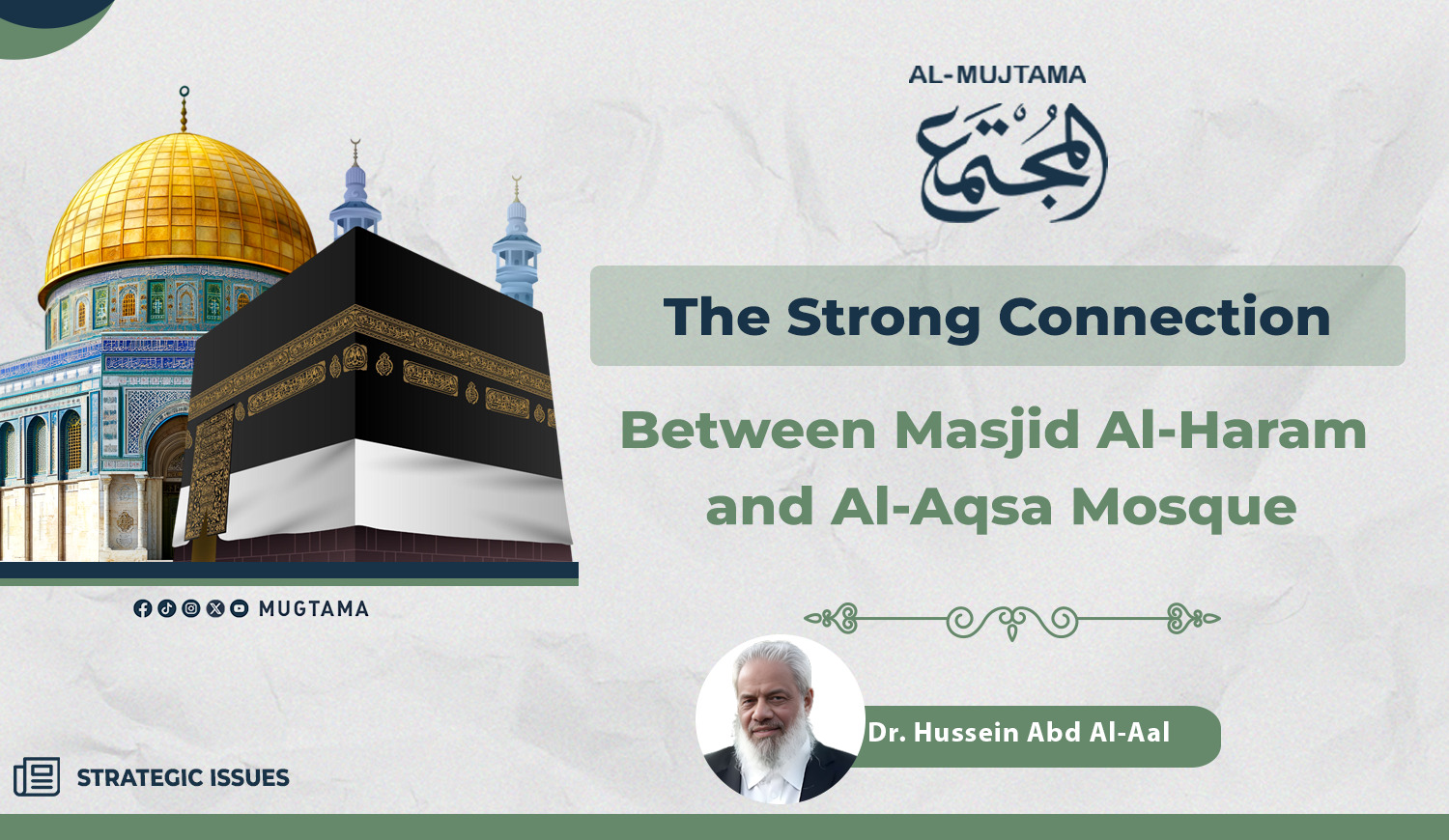The Strong Connection Between Masjid Al-Haram and Al-Aqsa Mosque

The Holy Kaaba is the House of Allah — may Allah increase its honor, exaltation, and reverence, its goodness and majesty. Al-Aqsa Mosque has also been honored and exalted by Allah Almighty. The relationship between them is one of honor, exaltation, and reverence. In the Hadith of Ibn Omar: "Indeed, the best of places are the mosques," and while all mosques share a general goodness, the Kaaba and Al-Aqsa Mosque share a special excellence. They are among the three greatest mosques on Earth. Abu Hurairah (may Allah be pleased with him) narrated that the Prophet (peace be upon him) said: "Journeys are not undertaken except to three mosques: Al-Masjid Al-Haram (in Mecca), the Mosque of the Messenger (peace be upon him) (in Medina), and Al-Aqsa Mosque (in Jerusalem)."
The
Quranic Connection
Allah Almighty established a strong
connection between them in the Holy Quran, saying:
" Exalted is He
who took His Servant by night from Al-Masjid Al-Haram to Al-Masjid Al-Aqsa.” (Al-Isra:
1).
Allah Almighty brought the two
mosques together in the journey of Al-Isra and Al-Mi'raj for our Prophet
Muhammad (peace be upon him). In this blessed journey, our Prophet (peace be
upon him) prepared himself from the Kaaba, then passed through Al-Aqsa Mosque,
and from there ascended to meet Allah Almighty above the seven heavens. Thus,
the relationship between the two Houses is that they were the last places our
Prophet (peace be upon him) visited before his ascension.
The
Connection of Construction and Sanctity
There is a connection even in the
construction of the two Houses, as they were the first two houses built for
people on Earth. Allah Almighty said:
“Indeed,
the first House [of worship] established for mankind was that at Bakkah (Mecca)
- blessed and a guidance for the worlds.” (Al-Imran: 96).
This was followed by the
construction of Al-Aqsa Mosque. Abu Dharr said: "I asked, 'O Messenger of
Allah, which mosque was built first?' He said, 'Al-Masjid Al-Haram.' I asked,
'Then which?' He said, 'Then Al-Masjid Al-Aqsa.' I asked, 'How much time was
between them?' He said, 'Forty years.'"
Scholars then explained that the
angels built them, or it was said Adam (peace be upon him), or it was said
Abraham (peace be upon him). The point is that they were built at close times,
and whoever built the Kaaba also built Al-Aqsa Mosque, thus establishing a
strong connection between them even in their construction. As for their
sanctity, there is much to say. Abu Dharr narrated: "We discussed, while
we were with the Messenger of Allah (peace be upon him), which was better: the
mosque of the Messenger of Allah (peace be upon him) or the mosque of
Jerusalem. The Messenger of Allah (peace be upon him) said: 'Prayer in this
mosque of mine is better than four prayers in it, and what an excellent place
of prayer it is. And soon it will be that a man will not have a space as small
as his horse's tether from the earth where he can see Bayt al-Maqdis
(Jerusalem) but it will be better for him than the whole world – or he said:
better than the world and what is in it.”
The Prophet
Prays Towards Both
One aspect of this strong
connection is that the Prophet (peace be upon him) prayed towards both;
meaning, he made them his Qiblah (direction of prayer). In Mecca, he prayed
towards Jerusalem with the Kaaba in front of him. When he migrated, he was
commanded to pray towards Jerusalem until he later turned to face the Kaaba.
Al-Bara' ibn Azib narrated: "When the Prophet (peace be upon him) first
arrived in Medina, he stayed with his ancestors, or he said his maternal uncles
from the Ansar. He prayed facing Jerusalem for sixteen or seventeen months. He
loved to have his Qiblah towards the Kaaba. The first prayer he prayed facing
the Kaaba was the Asr (afternoon) prayer, and a group of people prayed with
him. Then a man who had prayed with him left and passed by the people of a
mosque who were bowing in prayer. He said: 'I bear witness by Allah that I
prayed with the Messenger of Allah (peace be upon him) facing Mecca.' So, they
turned while they were in their position to face the Kaaba. The Jews and the
People of the Book were pleased when he prayed towards Jerusalem. But when he
turned his face towards the Kaaba, they disapproved of that." This means
that among the connections between the two Houses is that prayer was valid
towards them, either together or individually, until it later settled upon the
Holy Kaaba in Mecca.
Abraham
and Muhammad
It is well-known how strong the
relationship is between Prophet Abraham (peace be upon him) and Muhammad (peace
be upon him). It is a relationship of father and son, rather, a relationship of
prophethood, brotherhood, love, and affection between them. Moreover, our
Prophet Muhammad (peace be upon him) was commanded to follow the religion of
his father Abraham (peace be upon him), so they were upon one religion. Allah
Almighty said:
"
Then We revealed to you, [O Muhammad], to follow the religion of Abraham,
inclining to truth.” (An-Nahl: 123).
Look at this strong connection, and
how it is reflected in the two noble Houses. Abraham (peace be upon him)
migrated from Jerusalem to leave his son near the Holy Kaaba, and a second time
to raise the foundations of the Holy Kaaba—that House beside which Muhammad
(peace be upon him) was born. What is strange is that when he wished to meet
his Lord, he did not ascend from the Holy Kaaba, but rather traveled by night
to Al-Aqsa Mosque, where his father Abraham (peace be upon him) was. He met him
and led him in prayer inside Al-Aqsa Mosque with a group of prophets (peace be
upon them). From there, he ascended to meet his Lord, then returned to Al-Aqsa,
and then came back to Mecca. What a wondrous cycle, and what a strong
connection! It is a divine, concomitant relationship intended by Allah Almighty
between these purified, sacred places.
Omar and
Al-Aqsa Mosque
The name of the Commander of the
Faithful, Omar ibn Al-Khattab (may Allah be pleased with him), is
associated with the conquest of Jerusalem. It is always said: "Omar
conquered it." This is because Omar understood Allah Almighty's intent
behind Al-Isra and Al-Mi'raj, and he understood why the Prophet (peace be upon
him) prayed with the prophets in Jerusalem. Why didn't they gather for him in
the Holy Kaaba, for example?!
From this understanding, he
directed his armies to conquer the entirety of Sham (Greater Syria). More
importantly, he went himself, an unprecedented act since he assumed leadership.
He went personally to receive the keys to Jerusalem and entered himself to
clean the mosque and the dome from the filth that had been thrown upon them.
Then, he prayed in the mosque, signaling a new era for Al-Aqsa Mosque, as it
returned to Islamic sovereignty, as it had been during the time of Abraham
(peace be upon him) and the prophets after him. Al-Aqsa is neither Jewish
nor Christian; rather, it is a sacred mosque for Muslims in every time and
place. Its guardianship must always be for Muslims. From this, Omar placed
the trust and responsibility upon the shoulders of this Ummah until the Day of
Judgment.
The
Muslims' Duty Towards Al-Aqsa Today
Al-Aqsa Mosque is the third-holiest mosque for Muslims. Just as
Muslims are protective of the Kaaba and the Prophet's Mosque (peace be upon
him), they are obligated to be protective of Al-Aqsa Mosque. The fact that we
were born to find it captive does not mean this is its natural state. Rather,
this is a test and trial for the Ummah from Allah Almighty. Allah has tasked
this Ummah not to leave an inch of its land in the hands of its enemy, nor a
single captive from its children in the prisons of its enemy. How then about
Al-Aqsa Mosque, the first of the two Qiblas and the third of the two mosques?
This is even more worthy of liberation and purification.
This is precisely what Salahuddin
Al-Ayyubi (may Allah have mercy on him) understood. When he received a
message from one of the mosque's guards saying: "O King, who has
overthrown the symbols of the crosses, a complaint has come to you from the
Holy House. All mosques have been purified, but I remain defiled in my
honor."
At this, Salahuddin rose to the
religious duty and liberated it. The duty of the Ummah today is to rise with
all means to liberate it. This obligation and accountability will not cease
until its liberation is achieved. May Allah Almighty make us among His
soldiers.











